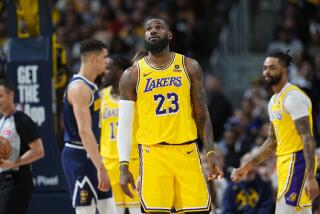Wally Moon Taking a Shot at Managing Yankee Farm Team
Everyone on the Prince William (Va.) Yankees of the Carolina League is learning something about baseball.
There’s the raw recruits, among them the possible future slugger who speaks four languages, 19-year-old Hensley (Bam-Bam) Meulens from Curacao, Netherlands Antilles. There’s Juan Bonilla, who as recently as last season played for the Baltimore Orioles and is now, at 31, a first-time player-coach. And there’s a rookie manager who actually is a veteran of the game, Wally Moon.
In 1954, Moon came up to the St. Louis Cardinals of Stan Musial and Red Schoendienst and replaced Enos Slaughter. In his first turn at bat in the major leagues, he hit a home run, and he was National League Rookie of the Year. As a Dodger playing in the Coliseum, he learned to pop opposite-field home runs over the left-field screen, 40 feet high but only 251 feet down the line from home plate. He became the baseball player best identified with a football stadium. His home runs were called “Moon shots.”
Since then, you may not have heard about Wally Moon. But he’s been around. He coached baseball for more than a decade at John Brown University in Siloam Springs, Ark.--his native Arkansas. He preferred to stay at home and raise his children. For five years, he owned the San Antonio Dodgers. Recently, he’s tended his cattle near his alma mater, Texas A&M;, in College Station. Three of his five children also graduated from A&M.; “Finally got them all married and educated--it was just my wife and I,” he said. “I kind of got the urge to get back into professional ball.”
He’s back, with a franchise that since 1978, in Alexandria, Va., and later (since ‘84) near Woodbridge in Prince William County, has helped fill the Washington area’s professional baseball void. At 57, Moon wears his familiar No. 9 but on an unfamiliar uniform--the Yankee pinstripes (the initials on the the cap and shirt are PW, not NY). An outdoorsman--he likes to bird hunt--Moon has a ruddy, weathered look. His bushy brows are gray, his sideburns white. He speaks slowly and punctuates his sentences--sometimes in the middle--with a stream of tobacco juice. Like the consistent hitter he used to be (.289 lifetime), he is a champion spitter--he hits a drain in the Yankees’ dugout floor almost every time. Leaning on a bat near the cage, or rapping repeated one-hoppers to a first baseman hours before a game, Moon seems synchronized with the game’s rhythms, its daily rituals and long haul.
Having raised a family and coached collegians, he seems particularly suited to managing a team as young as Prince William. His fatherly image can help ease the transition to independence and a new life for his Latin players--young Meulens and the veteran Bonilla serve Moon as interpreters for the other eight Yankee Latins, who speak little English. “He is a good man--takes everything real cool and nice,” said Meulens, who speaks English, Spanish, Dutch and a mixture of languages called Papiamento. “I think that attitude will get real far with this ballclub.”
Some think Meulens will get far enough to be a Yankee in New York. Moon is cautious but hopeful about Meulens’ future. Bonilla is confident about it. “There’s not a single doubt in my mind,” said Bonilla. Meulens, too, is certain. “I’m going to make it. I’m going to make it. I’m working hard to get there.” A third baseman, he has size--6 foot 3, 205 pounds. He can hit and field, has a strong arm and good enough speed. He’s smart.
“I feel really comfortable here,” Meulens said. “I really will feel more comfortable when I get my check.”
Bonilla would like to get back to play in New York; he played in eight games for the Yankees in 1985. “That’s my ultimate goal,” he said. “You never know till something happens.”
A week before spring training, Bonilla was running in an outfield in Sarasota, Fla., when he tripped on a water sprinkler head and tore his right ankle. The Yankees, who signed him in January as a free agent, sent him to Prince William to play his way back into shape, and to coach. He’s learning about managing and coaching not only from Moon but a pair of worthy coaches well-traveled as players: Jim Saul, who played for 18 minor league clubs, some more than once, and managed eight minor league years, and Dave Wehrmeister, who pitched in the minors most of his 14 seasons. Said Bonilla, “They’re teaching me, you can say, the ropes of the game about managing.”
The other day, Bonilla pitched batting practice. Meulens took lusty cuts, drilling balls to the little stadium’s outfield signboard fences.
From the dugout, Moon watched Meulens. It was the afternoon before a night game. Players were hitting, fielding, running. Popular songs came out of the loudspeakers. The sun was warm, the sky cloudless. A small plane flew over. “He’s a very hard worker,” Moon said. “But he hasn’t played all that much baseball. He’s the kind of a kid, you’ve got to give him a chance.”
Moon can remember his own baseball beginnings, and the game’s uncertainties. He grew up in Bay, Ark., listening to the Cardinals on radio. That swayed him to sign with them--that and the scout. “He picked me up when I was about 14, 15 years old, just stayed with me,” Moon said. “When I went to school at Texas A&M;, he followed me on down there. He’d get me after school and pack my books and drive me home. He wouldn’t let me out of his sight. His name was Freddie Hahn. He’s dead now. He signed a few good players.”
Moon thought he would be a Cardinal forever--”Yes I did,” he said. But they traded him to the Dodgers. “I had five pretty good years with the Cardinals. I was upset to say the least. It shocked me. But, in the final analysis, it turned out to be a real good trade for me. I went out there and got on three world championship ballclubs, huge crowds and a great atmosphere, and really and truly enjoyed playing for the Dodgers.
“But I was a Cardinal. And I knew damn well they didn’t get as much in exchange as they gave up.” (He and Phil Paine for Gino Cimoli).
Although the most home runs he hit in any of his seven Dodgers seasons was 19, Moon enjoyed the publicity his “Moon shots” generated. Certainly, he earned it, mastering an “inside-out” batting stroke that enabled him to reach the Coliseum’s close stands in left. “Even when I went in there with the visiting team, the tendency was to stack the lineup with right-handed hitters and try to take advantage of that screen.
“Suddenly, I’m traded out there. I thought, what in the hell, they don’t play left-handers on this ball club. But I had always been able to hit the ball to all fields. And I went out there and tried to pepper that screen, and I kept working on it and I found out I could lift one over it occasionally.”
Moon, who had to hit to left to preserve his career, can tell his young Prince William players about the value of adjusting to life’s situations. As for the opposite-field swing, he rarely teaches it except occasionally to right-handed batters working on the hit-and-run. But he imparts lots of other knowledge; while Class A may be baseball’s equivalent to elementary school, the youthful Yankees have the opportunity of sitting in on a semester of Moon’s postgraduate seminars.
“He’s helped me a lot mentally,” Meulens said. “He doesn’t want me to rush . . . I really appreciate what he’s been doing for us.” “Cool and nice”--that’s how he described Moon. “Maybe”--Meulens smiled--”it’s early in the season.”
Like Moon, Meulens already has made adjustments. He never imagined being signed (as a free agent) by the Yankees. Growing up, “I was a Dodger fan. I was following the Dodgers real close. I hated the Yankees before. But since I signed with them I really changed my mind now. I have to. I belong here now. I have the uniform on. So I’m a Yankee all the way now.”
If his Caribbean island has yet to produce a major leaguer, scouts have set out to change that and make history. Practically a flotilla has sailed to see “Bam-Bam” Meulens. The Yankees invited him to a tryout camp in the Dominican Republic. “One week before I went to the Dominican, the Pirates (Pittsburgh, which until this year backed the Alexandria-Prince William operation) wanted to sign me right away. Baltimore was interested in me, too--but at the time I was too young. I was 16. Boston was interested in signing me, too. The scout told me he wanted me to finish my school. So after that he would come back. But after that the Yankees were right there, and I signed.”
Bonilla fired a fastball to the plate, and Meulens, dug in in the batting cage, hit it hard to left. After he had gone to the clubhouse, a small boy came to the dugout looking for him. “Where’s ‘Bam-Bam?’ Meulens is liked in Prince William County.
By 7:30, the temperature had fallen and most of a crowd of 1,326 had assembled in Prince William County Stadium for the Yankees-Mets game--the Prince William Yankees and Lynchburg (Va.) Mets.
The Mets had two familiar names. Scott Jaster is a 6-foot 5-inch center fielder, son of former Cardinal pitcher Larry Jaster, and Craig Repoz is a skinny, 6-3 third baseman, son of former Yankee and Angel outfielder Roger Repoz.
WDCT, Fairfax, and WPWC, Dumfries, came on the air--the Prince William Yankees radio network. Of one particularly vicious swing Bonilla took in the fifth inning, play-by-play man Dave Collins noted, “He took a Jose Canseco swing in a Juan Bonilla body.”
Besides hitting the red Computer Learning Center sign in center field for a double in three at-bats--earlier he had said that just because he was in Class-A ball didn’t mean he was going to get a hit every time up--Bonilla made an outstanding play as the Yankees’ second baseman. After making a diving stop of a ball hit to his left, he got up and threw perfectly to first as the pitcher arrived. A major league play.
The score was 5-2, Lynchburg, eighth inning, bases loaded, one out, when the public address announcer boomed: “No. 24, ‘Bam-Bam’ Meulens.”
The perfect double play grounder Meulens hit to short suggested that for every bit of baseball destiny comes frustration--in this instance an empty-stomached feeling known to the perpetrator of an inning-ending twin killing and the lonely moment after his futile run to first.
It being baseball, he could cry that day, but win the next.
More to Read
Get our high school sports newsletter
Prep Rally is devoted to the SoCal high school sports experience, bringing you scores, stories and a behind-the-scenes look at what makes prep sports so popular.
You may occasionally receive promotional content from the Los Angeles Times.






